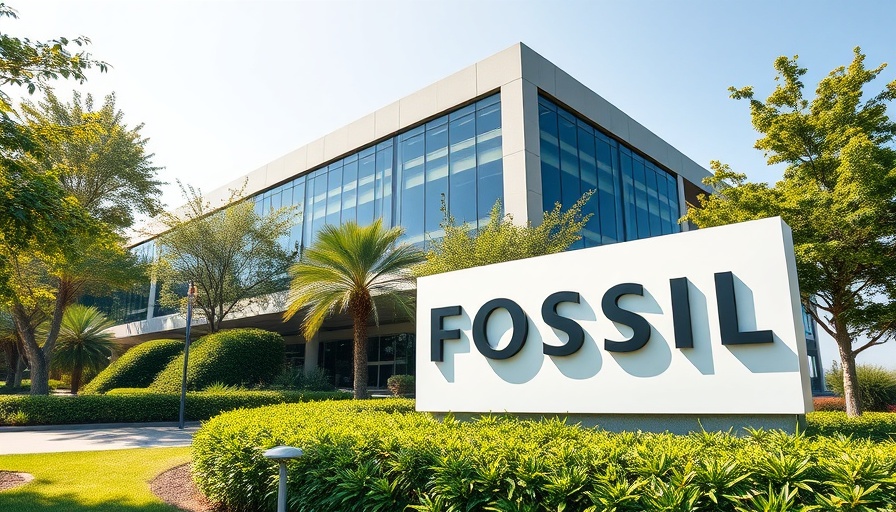
A Rough Road for Fossil: Store Closures Reflect Industry Struggles
Fossil Group Inc., a name synonymous with stylish watches, is experiencing a significant shift, announcing plans to close 50 of its nearly 250 retail locations across the country. This decision comes as a direct response to a troubling 19% drop in sales to $342.3 million during the fourth quarter of 2024, a trend that has persisted as the company grapples with evolving market dynamics and consumer preferences.
Founded in 1984, Fossil once thrived in a marketplace driven by its unique designs and innovations. However, recent years have seen the brand struggle, particularly following its exit from the smartwatch sector, a decision that contributed to its significant financial decline and inventory challenges. With a reported 29.4% decrease in inventory year over year, Fossil aims to streamline its operations by reducing corporate staff and closing underperforming stores.
What Does the Future Hold for Fossil?
Under the leadership of CEO Franco Fogliato, who took the helm in September 2024, Fossil is implementing a revival plan intended to refocus the brand on traditional watches. This new strategy not only aims to revitalize the product line but also includes improving the company’s online presence with a new website and innovative offerings. Fogliato is optimistic about these changes, projecting worldwide net sales of over $800 million by 2027.
The Impact of Corporate Changes on Business Strategy
As part of their turnaround strategy, Fossil is undergoing substantial changes in its executive team. Recent appointments include Randy Greben as CFO and Joe Martin as CCO, signaling a comprehensive approach to tackle the company's declining fortunes. These new leaders are expected to bring fresh perspectives on global sales and financial management, which are critical in navigating the competitive landscape of fashion retail.
Store Closures: A Necessary Evil?
With the impending closure of 50 stores, there’s an inevitable question: how will these closures affect the communities where they exist? The North Texas market, currently home to 33 Fossil stores, is closely watching Fossil’s moves. As the company looks to shed excess retail locations, it raises concerns among employees and local economies, particularly in areas dependent on retail as an economic driver.
In a broader context, these closures reflect a concerning trend seen across the retail landscape in Dallas and beyond. Brands that once thrived are reevaluating their physical footprints, often opting for an e-commerce focus that aligns with the realities of modern consumer behavior.
Turning Challenges into Opportunities
The pandemic has massively shifted consumer habits, with online shopping exploding while traditional retail sales waned. For Fossil, this downturn could unveil opportunities to innovate and explore new markets. The revival plan emphasizes traditional watches while also re-evaluating brand partnerships, a crucial consideration as consumer interests continue to evolve.
Additionally, the company has extended its license agreement with Michael Kors, a move that could prove beneficial in diversifying its offerings and attracting a broader audience. Striking the right balance between heritage and innovation seems vital for Fossil's long-term viability.
Staying Relevant in a Competitive Industry
Competition in the watch and accessories market is fierce, with companies like Apple and Garmin making significant inroads with technologically advanced products. To remain relevant, Fossil must not only embrace its legacy but also adapt to consumer expectations for functionality and style.
As Fossil navigates these changes, the focus on traditional watches suggests a commitment to nostalgic branding that could resonate with consumers looking for lasting value over fleeting trends.
Conclusion: A Call to Action for the Community
The challenges faced by Fossil are not just company-specific; they are a reflection of the larger economic and retail trends impacting businesses across Dallas. For community members, supporting local businesses, including those aiming for revival strategies like Fossil, can play a crucial role in sustaining the local economy. As consumers, we can influence the direction of our local businesses by supporting their journey forward.
Applying these insights allows individuals to better appreciate the challenges that fall on our favorite brands while enabling us to engage more thoughtfully with our shopping habits. Let’s consider supporting brands that are adapting to the new age of retail and explore how we can contribute to their success.
 Add Element
Add Element  Add Row
Add Row 



 Add Row
Add Row  Add
Add 


Write A Comment